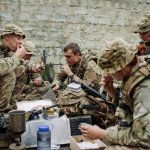Estimated reading time: 3 minutes
Following on from a previous blog about the MOD GEMS award scheme, and the use of our AWARD® evaluation solution to judge the entries, the winners have now been announced.
It was another successful year for the awards scheme, with 56 nominations. As ever, entrants came up with some fantastic ideas that will save the MOD money and time, and more importantly, the lives of our troops on the front line. I don’t have the space here to write about all the award winners and their ideas, but here is one of the highlights that will give you a taste of how the GEMS initiative benefits all parties involved.
I am certain you will all be fully aware of the Ebola (EVD) virus and the devastating effect the epidemic had in West Africa a couple of years ago. Breaking out in December 2013, it caused over 11,000 deaths with 26,000 cases documented. This was the largest outbreak of Ebola ever known, and it was finally declared as no longer an emergency on 29 March 2016.
In response to the Ebola threat a specially commissioned team of Army medical staff and partners formed the GRITROCK Training Development Team (TDT). This specialised team was responsible for ensuring that the demand was met for the training of military and civilian personnel in how to operate safely in this high risk environment.
With very limited guidelines available on treating Ebola, the team had to engineer innovative training materials for a diverse audience ranging from illiterates to professionally qualified personnel, including staff from both military and civilian backgrounds and speaking a range of languages. Due to the highly complex nature of this outbreak, and the dispersed group of people trying to stem it around the world, all training materials needed to be easily accessed by multiple organisations on a 24/7 basis, across multiple time zones and in isolated areas of operations.
This year’s Digital and Technology Innovation Award went to the GRITROCK TDT – who designed, developed and deployed a series of training programmes and launched an 800-man mission to combat the spread of the virus across West Africa. This on-going e-learning resource remains available for any future outbreaks and incorporates all the lessons learnt by the team.
Ultimately the key measure of success for this project is the number of lives saved as well as the protection of medical personnel from becoming infected. At the peak of the epidemic, 600 people lost their lives every day. With effective medical intervention from GRITROCK the daily figure of lives lost dropped from 600 a day to less than one per day. Only one British medical worker contracted the disease.
This was only one of seven awards that were presented as a result of this year’s GEMS scheme. I hope this insight has illustrated just how impressive the standard of entries is, and how valuable the scheme is in recognising exceptional ideas and innovation.


